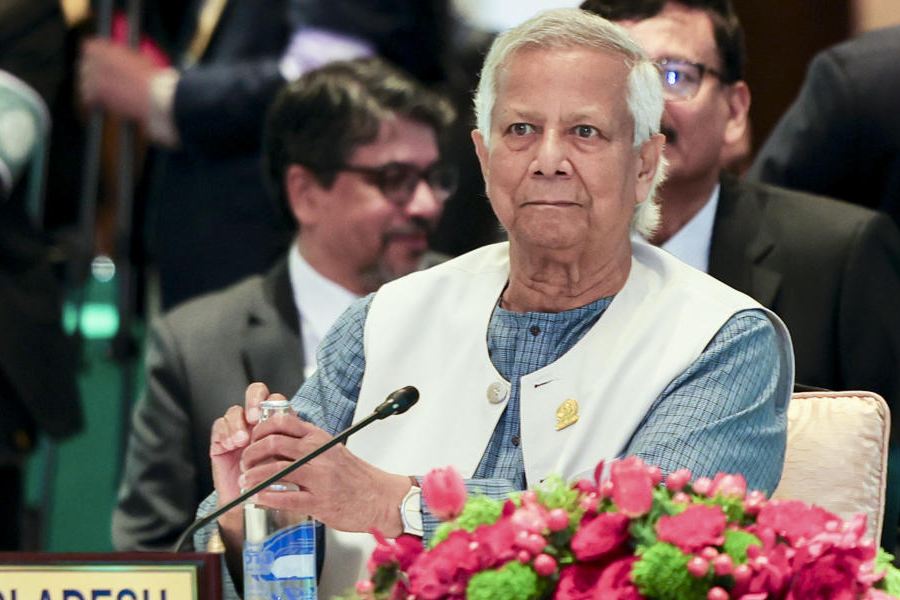 |
 |
| Second round of admissions for undergraduate courses on at BJB (Autonomous) College in Bhubaneswar. Telegraph picture |
From admission to seminars
The second round of admission for undergraduate courses at BJB (Autonomous) College, Bhubaneswar, was held on July 11 and 12. A total of 133 students were admitted in the arts, science and commerce streams. The cut-off percentage in arts for general students stood at 63.50 per cent and 45 students got admission. For students with physics-chemistry-mathematics (PCM) combination, the qualifying mark was 84.33 per cent and for chemistry-zoology-botany (CBZ) combination, it was 80.33 per cent. Sixteen seats were filled up for PCM and 10 for CBZ. Three and five students got admission into computer science and biotechnology courses, respectively. For commerce stream, the cut-off percentage for general students was 77.58 per cent and 54 students were admitted. Presently, 51 seats are yet to be filled up in arts stream whereas commerce has 22 vacant seats. For PCM combination, the number of vacancies is 36 while for CBZ, it is 18. The turnout of science candidates has been reported to be low due to the ongoing Orissa Joint Entrance Examination (OJEE)-2011 counselling.
Seminar on education
A UGC-sponsored national seminar on “Regional imbalance in education” was organised at the Dr PM Institute of Advanced Study in Education, Sambalpur, on July 9. Over100 students attended the seminar. “The rich always avail the best in education — big schools with state-of-art facilities and infrastructure — while students belonging to middle class families avail average facilities. The poor is debarred from enjoying these privileges,” said Prafulla Chandra Mohapatra, chairperson, National Council for Teacher Education in Bhubaneswar and guest of honour on the occasion. “Poor students generally take admission into government schools. Though the government provides these with midday meals, there are not enough teachers or proper infrastructure. This is an era of digitisation and information technology but students in government schools hardly get access to such facilities,” added Mohapatra. Aditya Prashad Padhee, former vice-chancellor of Berhampur University and a guest at the seminar, said the lectures of eminent scholars should be video-graphed and displayed in educational institutions.
Debate competition
 |
 |
| Guests attend the 13th Foundation Day celebration at Fakir Mohan University in Balasore. (Above) Scientist Sanjeeb Kumar Sahoo speaks at the AICTE-sponsored staff development programme at School of Pharmaceutical Sciences in Bhubaneswar. Telegraph pictures |
A debate on quality education occupied centrestage at the 13th Foundation Day celebrations at the Fakir Mohan University, Balasore, on July 11. “With privatisation and globalisation, education is no longer the monopoly of the crème layer of society. With increased competition, there is a great need to ensure quality and courses to suit the demands of job market,” chief guest, minister of steel, mines, industries and parliamentary affairs minister, Raghunath Mohanty said. Minister of higher education, Badrinarayan Patra, and tourism and culture minister, Prafulla Samal, who were among the guests, echoed Mohanty’s views. They said the state government is taking serious measures in this regard. Vice-chancellor of Fakir Mohan University, Balasore, Kumarbar Das highlighted the achievements of the students and put forth demands for two buses, healthcare facility and ambulance services on the campus before the guests. He also stressed on the opening of school of literature studies in the university. Eminent persons of Balasore and Bhadrak districts, Madhusudan Padhi, Brajendra Sethi, Gouchandra Mohapatra and Chittaranjan Sahu were honoured by the university for their notable contributions in their respective fields. The university also felicitated some of the teaching as well as non-teaching staffs. The function was held at the university’s new campus at Nuapadhi.
Leadership meet
A six-day programme on “Organisational Behaviour and Leadership Development” was inaugurated at the Xavier’s Institute of Management, Bhubaneswar (XIMB), on July 4 for the scientists of Geological Survey of India (GSI). Its uniqueness comes from the fact that the nine facilitators who attended the programme were from different operational backgrounds like general management, marketing, operations, finance, strategic management, apart from the regular organisational behaviour and human resource. The programme was inaugurated by GSI-Orissa’s director-in-charge, H. Sarvothamam, director of technical operations, S.B. Ray, director of regional training institute, S.K. Mitra, XIMB director, Father P.T. Joseph, and programme coordinator, Mallika Nawal The programme concluded with the valediction on July 9, presided over by K. Ayyasami, deputy director general of GSI training institute.
Nanotechnology
Exuding hope that battling cancer would become easier and affordable in a few years, scientist Sanjeeb Kumar Sahoo said nanodevices can be built to precisely deliver drugs to cancer cells, leaving healthy cells untouched, thereby considerably eliminating the side effects of the present treatment method. Sahoo was speaking at the inauguration of a fortnight-long AICTE-sponsored staff development programme on “Derivatisation of Nano Material for Drug Delivery and Biomedical Applications” on July 12 at the School of Pharmaceutical Sciences (SPS) under Siksha ‘O’ Anusandhan University, Bhubaneswar. Nanotechnology would make treatment affordable as the cost of cancer therapy is highly prohibitive at present, Sahoo said adding while that two to three products were already in the market and more than 100 others were in various stages of clinical trial. Explaining the present method of cancer therapy, Sahoo said it had several side effects including toxicity to chronic exposure to chemotherapy and radiation, non-specific delivery, administration of high dose due to poor absorption and water insolubility. “But nanotechnology can decrease the toxic side effects, protecting the drug from degradation, producing prolonged release of the drug and ensuring its targeted delivery. It can also help detect prostate cancer at a very early stage though the tumour grows at a very slow pace,” he said.
Shilpi Sampad, Subrat Mohanty and Sibdas Kundu











